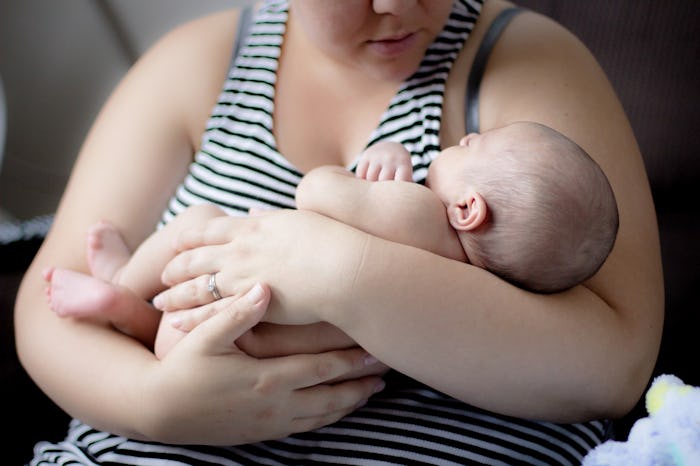Life
How Parenting Affects Younger Moms' Mental Health Versus Older Moms' Mental Health
If you're a mom or thinking about motherhood, you've probably seen a lot of articles debating when is the best time to have kids. Although there's no ideal age to have a baby (everyone is different, right?), there are some distinct differences between younger moms and older moms, especially where it concerns mental health. According to a recent study, "The Association Between Maternal Age and Depression," older moms are more susceptible to depression than younger moms.
The studies authors, K.S. Joseph and Giulia Muraca, collected data on Canadian women aged 20 to 44 years from 2007 to 2008. Joseph and Muraca found that "among women who had delivered recently, 8.0 percent (207 of 2326) were depressed compared with 10 percent (597 of 5610) of women who had not recently delivered," according to Plos Medicine. Joseph and Muraca went on to discover that "the prevalence of depression in women who had recently delivered was significantly higher in women aged 40 to 44 years than in women aged 30 to 35 years," according to the Journal of Obstetrics and Gynaecology Canada.
Muraca said of her findings, according to The Telegraph:
Anxiety during pregnancy has been found to be one of the strongest predictors of depression after childbirth.There is a lot of rhetoric talking about the biological risk, and that is really discomforting for women in that age group. We found that women [who have recently given birth] aged 40-44 have almost five times the odds of experiencing depression than women at younger age groups.
According to Muraca, older moms are more likely to suffer depression than younger moms because they tend to have less support in general, and they have fewer friends going through the same experience. Furthermore, Muraca believes older moms tend to be more anxious about their pregnancy than younger moms, and this anxiety tends to carry over into their parenting. According to the HuffPost, "having an anxiety disorder is the single most significant predictor that a person will develop depression."
Muraca said of older moms' increased risk for depression, according to Women's Mental Health:
This increased risk has been attributed to a variety of factors, such as the perception that older women have more difficult experiences and adjustments to motherhood, and the lack of peer support due to deviations from social norms surrounding maternal age.
Obviously, it's important to note that Muraca's study is just one look at the relationship between age and the mental health of moms. Muraca's study aside, it's important to remember that your mental health is a top priority. Although age can play a role in a mom's mental state, there are many other factors at play, and it helps to be cognizant of all the variables.
